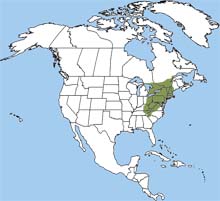Hairy-tailed Mole - Parascalops breweri |
|||||||||
CharacteristicsThe hairy-tailed mole is five to seven inches in length. It has gray-black to black fur on top and a slightly lighter fur on its undersides. It has a long, red-tipped snout; a short, bristly-haired tail; tiny hair-covered eyes and long, sharp front claws that help it burrow. Range |
HabitatThe hairy-tailed mole prefers areas with dry, sandy, or loamy soil. It is found in forests, open fields, old pastures, cultivated fields, lawns, and golf courses. DietThe hairy-tailed mole spends the day tunneling under the ground and searching for food. It sometimes comes out at night to search for food. It eats earthworms, grubs, beetles, ants, and other invertebrates. Life CycleIn the spring, male hairy-tailed moles find females in their burrows and mate with them. The female gives birth to four to five young. They are weaned when they are about a month old. The hairy-tailed mole has a life span of four to five years. BehaviorThe hairy-tailed mole constructs elaborate tunnel systems under the earth. It may share its system with other moles. When a hairy-tailed mole dies, its system may be taken over by another mole. The hairy-tailed mole is active during the winter, and it goes deeper into its tunnels to stay warm. |
||||||||

 The hairy-tailed mole is found from southeastern Canada and New England, including New Hampshire, southwest through the mountains of Tennessee and North Carolina.
The hairy-tailed mole is found from southeastern Canada and New England, including New Hampshire, southwest through the mountains of Tennessee and North Carolina.